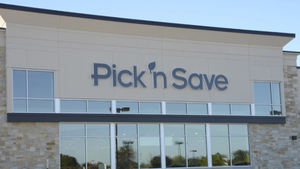KROGER PLANS MUSIC KIOSK COMPOSITION IN 100 STORES
ATLANTA -- Kroger plans to add music kiosks to 100 of the Atlanta Kroger Marketing Area's 153 stores by Thanksgiving, following a successful 10-store merchandising test of the audio cassettes and compact discs.The kiosk, called the KRGR Music Power Station, displays 32 titles priced at $7.99 to $16.99. Selections feature a variety of music genres, from recognizable hits and classical to easy listening,
November 3, 1997
JOEL ELSON
ATLANTA -- Kroger plans to add music kiosks to 100 of the Atlanta Kroger Marketing Area's 153 stores by Thanksgiving, following a successful 10-store merchandising test of the audio cassettes and compact discs.
The kiosk, called the KRGR Music Power Station, displays 32 titles priced at $7.99 to $16.99. Selections feature a variety of music genres, from recognizable hits and classical to easy listening, rock and roll, country, inspirational and big bands. A recent store flier featured instrumental CDs from The Myst of Eden Series "Hope" and "More Hope" by David Teems from Forestory Music.
Cincinnati-based Kroger also may roll kiosks into its Nashville, Columbus and Detroit KMAs early next year, said Rick Terrill, vice president of new business development at Entertainment & Media Network, the supplier, here. Kroger declined to comment on its music program.
Putting the music centers in other KMAs "is part of Kroger's growth strategy in trying to expand this concept," said James Casto, president of Entertainment & Media's music division.
Moreover, Kroger has indicated it would like to test its in-house radio program, KRGR Kroger Radio, in these additional marketing areas as well, explained Casto. "The radio station is sort of the locomotive that drives everything else, and so there are plans to test it in other KMAs," he added.
Expanding the music center program is based on the sales performance at the 10 Atlanta KMA pilot stores, instituted a year ago, he said.
Casto said Kroger's idea for the music centers came after customers began asking managers where to buy the music they heard over the stores' radio broadcasts. "Customers told managers they liked the music they were hearing and wanted to know where they could buy it to play in their cars," said Casto.
Kroger's direct-to-store 24-hour customized live radio station originates in Atlanta and has been running for three years. It is now heard in the KMA's 153 stores. Entertainment & Media handles programming, selects the music and sells ads. Radio advertisers include food and beverage suppliers and local companies like automobile dealers.
"It's all then sent on a high-speed data line, and beamed up to a satellite for transmission to dishes at Atlanta KMA stores," said Casto
Although Kroger declined to comment on the music centers or the radio broadcasts, a spokesman in the chain's corporate headquarters in Cincinnati told SN the retailer "has been one of the pioneers in putting that [type] of in-house radio station in a supermarket." Profit margins on the music products offered in the kiosks range between 15% and 50%. "The profit can be higher when dealing with a local artist trying to get his foot into the field, but lower when working with a large label," Casto explained.
The item assortment on the 3-foot-wide kiosk is changed about every two months.
Under the test phase of the music centers, Casto said, products seemed to move better merchandised at a perimeter area either at the middle or end of the shopping trip. During the pilot, unit sales have ranged up to 30 to 75 a week per store in some areas, and from five to 20 a week per location in other stores. It was triple that amount last Christmas, Casto added.
The products have sold equally well in lower- and middle-income communities, he said. "Our approach is different because of the [Kroger] radio station. We're not a company going in and just trying to sell music. It's a very cooperative process. The idea is to feature an artist over the radio and conduct interviews so the consumer knows who it is and what it's about, and then make the product available for sale."
Kroger also uses the music center and radio station to promote the store as well as other grocery products. For example, it placed discount coupons for grocery items like cereal in the CD packs. A year ago KRGR Radio worked with Chrysler Plymouth to run a sweepstakes with a $15,000 Plymouth Voyager as the prize, and the winner was drawn on the air.
About the Author
You May Also Like




